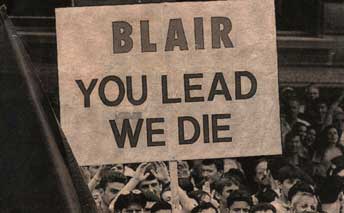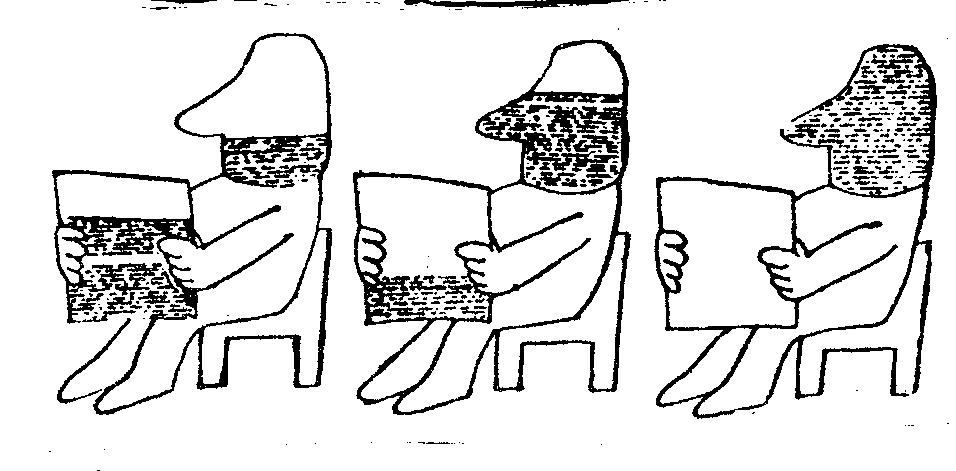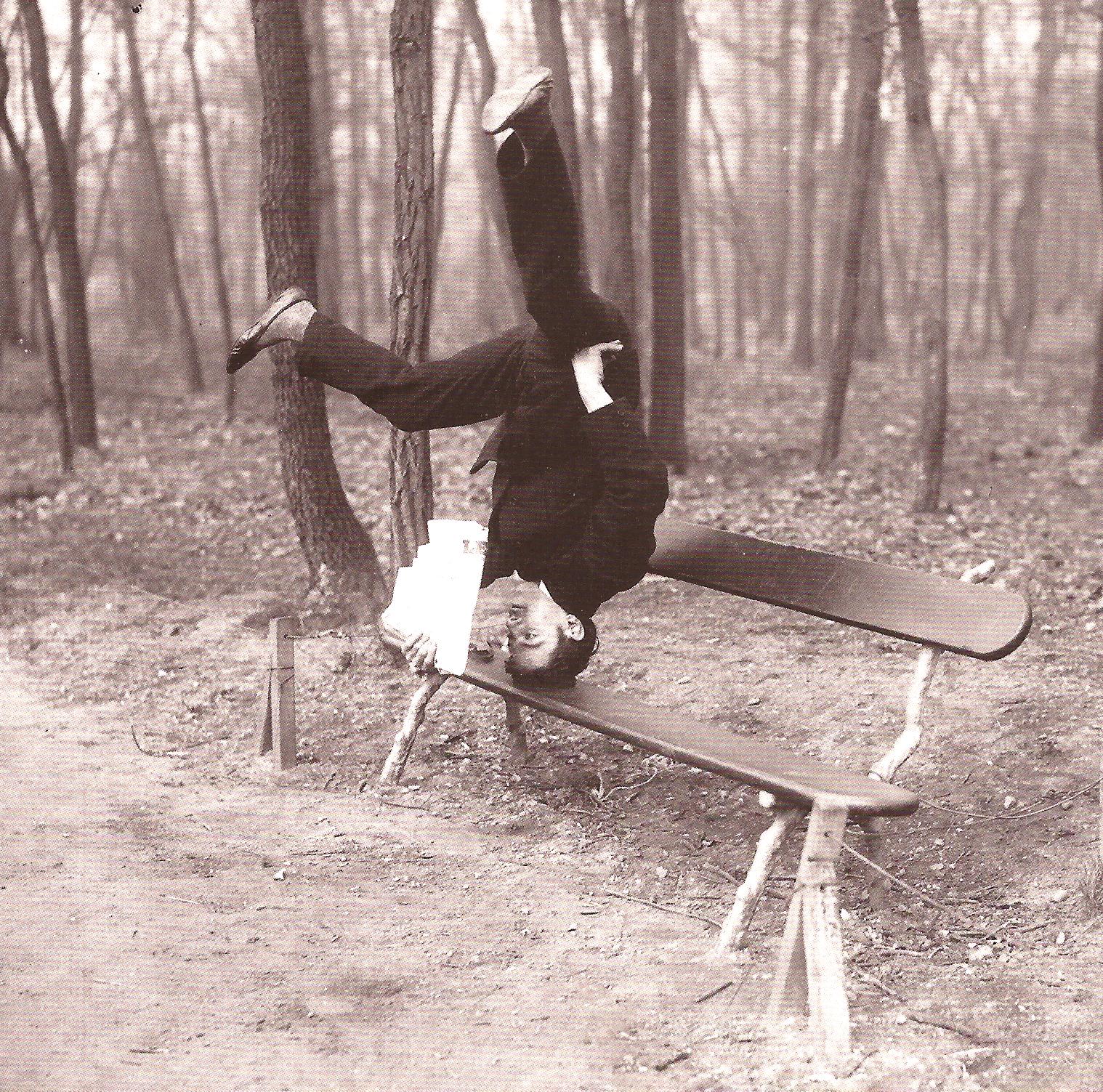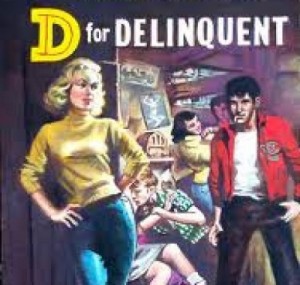(strangely, no irony was intended)
There was a report half way through the war of an Italian refugee charity arriving at the border of Kosovo with a camera crew and ambulance, and spiriting away an old woman refugee who’d collapsed – all of it faithfully filmed for Italian TV. It was the first time during the war the charity had done anything. It turned out that the woman had merely fainted – and, as a result of this dramatic intervention she became extremely upset, hardly surprising, since she’d been separated from her family who, in the meantime, had been shoved off to some other refugee camp, and no-one knew where they were. Once you enter this world of TV, of image, of the appearance of goodness, “care”, “charity” & “humanitarianism” are but masks for indifference: everything’s just a photo-opportunity. The more all-pervasive these role-bound relations are the more such functionalising of people appears as ‘natural’. The media is simply an arm of the State, making modern alienated spectacular relations seem reasonable and inevitable.
In the Kosovo war the official ‘truth’ from NATO was easily the main one presented by the media — at least on TV and in the tabloids — and if there was any other ‘truth’ that was presented to the vast majority it was usually the Serb State’s version of events. Though this black and white so-called clarity is presented in a greyer, subtler light in this country than in the crude American Good-guys v. Bad-guys media, such so-called clarity ironically leads to a greater confusion in many ways – since the apparently morally good intentions are so contradicted by the reality of what’s actually happened. So most people felt confused, and wished the whole thing would stop and ended up,in the absence of doing something, switching off the news: it’s all too perplexing. That’s why reporting of the war was often upstaged by far more vital matters, such as Sophie Rhys-Jones appearing slightly topless in The Sun. And that’s why there were fewer and fewer letters about it in the papers, and people wanted to talk about it less and less. So whether people felt ‘clear’ (for NATO) or confused – the important result was passivity.
Before World War II workers, socialists, anarchists – even fascists – would speak in streets and parks up and down the country directly to the people around. With the increasing domestication of the post-war society of the spectacle, the essential function of the media has been to colonise people with the ruling ideas and keep them isolated and passive, whether as listeners, viewers or followers. That is, to discourage any practical and/or independent collective & individual opposition. The only practice the media encourage is writing letters to the papers, phoning phone-ins or getting people to ask a question on Question Time, or some other tightly-controlled debate. And even then they have a 15 second loop to ensure that everything remains within their control. Most of those who participate in these pseudo-dialogues almost invariably feel utterly frustrated and humiliated by them. Or else they feel contented with their 15 minutes of fame – an image of importance to compensate for an insignificant life.
One of the essential functions of the media is to present the choices coming from different arguments within the ruling class as the only possible and the only realistic choices. So, if there seems to be a far greater diversity of opinions presented in this last war than, say, the Gulf War, that’s partly because there are real divisions within ruling circles about the war – divisions between pro-US, pro-Europe and pro- Russian sections. But it’s also because the Gulf War came shortly after the Poll Tax struggle: the necessity to present an image of national unity, and to therefore present a greater degree of ideological unity, as a way of suppressing any internal opposition, was more pressing then. Nowadays, with the class struggle utterly marginalised (the now distant memory of Poll Tax being still the last time there was any significant national crisis for the ruling class ** ) the media can afford to voice real differences and arguments – within ruling ideas, of course – as the threat of significant practical opposition is virtually nil. Compare, for example, with France, where there have been important national crises for the bourgeoisie over the last few years: there the media is as totalitarian as it was during the Gulf War – virtually undiluted NATO propaganda, with hardly a murmur of mild dissent.
The TV, radio and papers are essentially a closed one-way monologue of the ruling world which, at the same time, tries to involve the spectators in such a way as to give the illusion of dialogue, openness and balance. So a BBC radio programme reading out listeners letters will read one accusing them of being NATO’s mouthpiece and another accusing them of putting out Serb propaganda. The media allows criticism of aspects of the State and of the commodity economy as long as there is no fundamental critique of the State and the commodity economy. This is not to suggest that those developing a fundamental critique should participate in the media: it would be utterly contradictory to do so. How can one criticise the absence of dialogue in this world by means that enforce this absence? How can one criticise hierarchy by hierarchical means? In a society which allows everything to be said (in its officially designated time and. place, of course) freedom of speech without practical consequences is paraded as the essence of democracy. “Complain all you want – but do as you’re told”, as Frederick the Great once said. Only the rulers have the freedom to enforce their ideas practically. The only worthwhile ‘participation’ in such media would be in order to practically sabotage it – physically subvert its form and content. This is not to say that mass “media” couldn’t exist in a free society – but it would be used and controlled in an unmediated way – for example, to broadcast the different debates and decisions of mass popular assemblies of people transforming the world directly. But as things stand, people are permitted to criticise this or that detail because that can only help the system manipulate people better – but attacking the essential is forbidden. So, for example, everything in the mass media has said that NATO’s intentions were good — the debate was reduced to merely how the intentions were carried out. Even in the ‘serious’ papers it’s rare to hear criticisms of NATO’s intentions — and I’ve not seen any attempt to reveal their real intentions.
In Serbia, the State media use the “Big Lie” technique of Goebells (“the bigger the lie, the more it is believed”). So, ethnic cleansing did not exist, the only reason Kosovars fled was because of NATO’s bombing, and Serbia won the war. The media here broadcast Serb propaganda to show how open they are in comparison. It would be too crude to state this explicitly, of course – instead it’s hinted at implicitly, to give the spectator the feeling that they’re working things out for themselves, that they’ve got a mind of their own. But this apparent comparative openness is essential as a screen to hide the secret manoeuvres and machinations of the various factions that make up NATO. Just as a crudely overtly lying authoritarian individual is less likely to get what he or she wants than a subtly manipulative one, so the crude use of the Big Lie is more likely to be met with a healthy scepticism than the confusion reaped by those who con people with all the appearance of being open to criticism and dissent. Thus John Humphrys on the radio can aggressively criticise Robin Cook for excessive bombing of Serb factories: it gives the appearance of freedom of expression whilst, of course, the function of these “excessive” bombings is never spoken about. In fact, such interviewers are always playing “devil’s advocate” as a kind of pretension to dialectical critique (whilst never looking beneath the surface, which is the essence of dialectics). Given this, the listener can ignore even any minor worthwhile point made because, after all, the interviewer’s just playing a role, doing his banal job, playing, as usual, at polemical political discourse, and, therefore not to be taken seriously *** . The essential impression given, though, is the idea of the BBC’s independence from Government policy. And that’s probably why New Labour chastised John Simpson’s reports from Belgrade — it helped reinforce the image of the BBC’s apparent freedom from State control. So that when, for instance, Simpson faithfully reported the official lie that Milosevic’s acceptance of the June 3rd peace agreement was abject surrender to the terms of the Rambouillet Accord it could be accepted that this was “objective truth “ and not NATO spin. Just as an individual who constantly lies is never believed, so the media lies sparingly – all the better to con people with a Big Lie.
Sure, there have been a few “small” lies in this war — but the media were careful to quote others as reporting these lies. For example, the story of the rounding up of Kosovars to imprison them in a stadium, when there was no stadium. Or Robin Cook quoting sources from a village in Kosovo which said that 20 teachers from the village had been killed, when the village only had one teacher. But then these are later admitted to be “mistakes”, rather like the killing of civilians. The belated admission to certain factual mistakes (usually muted and long after their propaganda value has served its purpose) serves a similar function to the admission of military “mistakes”: if you apologise you can always get away with so much more. Compare with Serb State propaganda: simple denial of obvious facts, no apologies. Saying sorry makes hierarchy seem “human” — well, we all make mistakes – as if such “mistakes”, unlike those mistakes we all make, aren’t the inevitable result of both indifference to factual truth and to ‘ordinary’ people’s lives. For the powers-that-be, facts, like the lives of you and me, are merely a function of their hierarchical use. Same with admitting that they got it wrong: it takes the wind out of the opposition, and allows them to continue to get away with more of the same.
“Freedom of expression” in this society is mostly reserved for those who make a profession out of “expressing themselves”. For the rest – well, we take our chances. Thus a demonstration in April in Brussels against NATO was banned by the Town Council, as were any leaflets or posters. And the few demonstrators who turned up were beaten brutally by the police, with many of them being arrested, and the non-Belgians being ejected from the country. This repressed attempt at “free expression” was not reported in the media here, despite the fact that a journalist cameraman was also beaten up when he refused to hand his camera over to the cops. Likewise, for the most part, independent opposition in other countries throughout the world was hardly reported, and, then virtually only in the “quality” papers. However, in other respects, outright censorship was not normally employed, unlike in Serbia. Instead, facts were mentioned very sparingly— for instance, the bombing, of Montenegro’s main airport a month into the war was mentioned for a couple of hours on TV, but hardly anywhere else, and then apparently forgotten about: what they wanted to emphasise was Serbia’smilitary manipulation of Montenegro. Likewise, incubators being turned off in a Belgrade hospital as a result of NATO bombing of electricity plants was shown on TV just twice and without comment – compare that to how much the lie about Iraqui soldiers turning off the incubators in Kuwait in 1990 was constantly repeated. These casual mentions give the feeling that everything is talked about, that nothing is censored — but often, it’s rather like mentioning that the world comes to an end tomorrow in a half inch small printed column on page 21. Essential facts are often not censored, but are buried under a welter of largely irrelevant details.
Equally, the totality of this world is presented by the media under separate categories which are meant to be completely unconnected. So, for example, the fact that Alan Greenspan, head of the Bank of America, said, a few weeks ago, that the US economy is extremely weak, and has nowhere to go but down, despite the fact that the DOW shot through not just the 10000 mark but also the 11000 mark since the war began — all this is kept separate from the news of the devastation of Serbia’s infrastructure. To connect these 2 facts may be considered too dangerous an allusion.
SamFantoSamotnaf, June 1999.
P.S. During this war a kind of friend of mine said over the phone that he’d bumped into Jon Snow – the mildly liberal mildly lefty TV journalist – and that Snow had mentioned the bombing of Iraq during the Balkan war. My kind of friend suggested he report this bombing on TV, and Snow said he would (in fact, he never did). Why do people try to impress with such name-dropping? Somehow it makes them feel significant – like collecting autographs: connecting to celebrity in some way is like having a little entry into the world of Power, a proxy claim to fame. And that, basically, is what the media is: a window onto the dominant world that constantly entices you in, and into a polite dialogue with it. But refusing all that cynical shit is the only way to have some margin of dignity, some sense of self-worth and honesty, and some degree of clarity. If you want to be able to look yourself in the mirror and not lie to yourself, then just say fuck off to all that crap.
Most of this was written in June 1999, but little bits were added to it since.
The following text was put out by ‘No War But The Class War’ at the beginning of June 1999, in response to the Balkan war. It was mainly written by me, though agreed to and put out in the group name:
MILOSOVIC OR NATO
Frying Pan or Fire
“I will not choose sides in this conflict…I don’t want to die in order to support those pigs in Serbia. I do not want to die for the ‘free and united’ Europe. They have led us to absurdity and our existence to irrationality.”
– a guy from Serbia, March 30th 1999.
Despite the depression, the confusion, the horror, the feelings of uselessness, the desire to just forget about or numb ourselves to this war, certain cold heavy concrete facts have to be faced. Perhaps they are even obvious:
A few days before this war began Carl Bildt, ex-PM of Sweden, and a former European ‘peacebroker’ in Bosnia, declared that if Serbia was bombed there’d be “more than one million refugees from Kosovo”. Since NATO knew this, it’s clear it couldn’t care less about the Kosovars, except as pawns in their sick game. That’s why the Serb airforce were informed by NATO that if they kept below 5000 metres in Kosovo they wouldn’t be fired upon (publicized in France, but not here). Beneath the ‘humanitarian’ pretext, the calculating cynicism of competing capitalist interests.
The destruction of over $250 billion worth of infrastructure in the Balkans is a war against us – the international mass of dispossessed individuals forced to survive in the increasingly overwhelming jungle of the world market. The Balkans has been chosen for this massacre partly because, despite years of manipulated nationalism and ethnic slaughter, the working class there have continued to resist the IMF-imposed austerity of the ‘free’ market. That’s why the Rambouillet declaration of war insisted that ‘the economy of Kosovo shall function in accordance with free market principles’. That’s why a car factory occupied by workers fighting its threatened closure was one of the first to be bombed. And that’s why it’s Albania that’s been chosen to be militarily, hierarchically, organized: after all, the armed rebellion of ’97 there dangerously threatened any notion of national identity, even if its class identity was unclearly expressed.1
NATOnalist KLAptrap
From first-hand reports we’ve heard that Kosovar refugees in the Macedonian camps who criticise NATO’s bombing and say they have nothing against ordinary Serbs have been prevented by the KLA from speaking to the media there: it’s disrespectful to their saviours. The KLA high-ups play expedient complicity-rivalry politics with NATO because they’ll be rewarded, at least temporarily, with power and money as subservient rulers of the future hell of Kosovo. Partly financed by German capital, the KLA pushes nationalism as the illusion of community, the fantasy of some exit from meaningless desperation. Ironically, the slogans “NATO is our only hope” and “Blair – you lead, we die” is expressed by those who believe in “self-determination”, slogans that admit that the vast majority of selves will be determined by international capital in its most brutal contemptuous unopposed form.
CAPITALIST “PEACE” OR CAPITALIST WAR
Frying Pan or Fire
Clearly the bombing in this war will stop. And then what? Capitalist ‘peace’ is the consolation prize for capitalist war. Kill a million and you tame a billion. And capitalist peace is always temporary: it’s a preparation for further war. And next time it really could go nuclear (the only time during this war most people here felt the chill reality of it was when the Russian rulers rattled their sabers). Besides, every day capitalist ‘peace’ kills over 20,000 kids worldwide, through malnutrition etc. And ecological collapse is also ‘peaceful’. Even with ‘peace’ such a collapse in the Balkans will now mean living indefinitely in a highly toxic environment. As for us, capitalist peace is often a slow death of shattered dreams within the daily battle ground of each against all, a highly stressful unpeaceful existence.
Bruce Kent, head of CND proposed sanctions against Iraq as an alternative to war. UN sanctions kill 4000 kids there every month. To look to the UN for some hope against the despairing future we face is nonsense. Only organising our own struggle against the mirage of hope that various celebrities try to conjure up for us has any genuine hope.
BRINGING THE WAR TO THE WARMONGERS – REASONS TO BE CHEERFUL
-
Fischer, Germany’s Green foreign minister, suffered a burst ear drum in the paint bomb attack on him (this probably won’t make him any more unbalanced or deaf to reason than he already is ).
-
1000 people in Aleksandrovac in Serbia lynched the pro-Milosovic mayor there when he refused demands to stop troops returning to Kosovo after home leave (sadly, he survived). Thousands of Serb reservists in Kosovo have deserted, seizing military equipment and rushing back to the home towns to stop their demonstrating friends and families being beaten and arrested by the paramilitaries.
-
1000s of Italian workers went on strike against the war (May13th). Before that a gate to an Italian NATO barracks was burned down by angry demonstrators.
DON’T TAKE SIDES – MAKE SIDES!
The pitiful level of opposition (including our own) to, and interest in, the war in the UK so far reflects the feeling that all struggle seems futile. This is a self-fulfilling prophecy. If we’re not going to roll over and die, we shall have to find new ways of fighting back which correct out past failures. This will partly involve preparing ourselves for the next war. Where will this be? Maybe in Korea or Indonesia, where the combination of intense class struggle and the proximity of Chinese and Japanese capitalist interests give Europe and the US good reasons for manipulating a military crisis.
“How long can we bear this crazy terrifying future capital has planned for us? Or shall we just content ourselves with the false choices of still more demos and meetings that virtually challenge nothing or staying home watching the telly? Or what?”
-
a guy from London, May 31st, 1999.
The original leaflet was then followed by an announcement of a meeting, a mailing and emailing address and a particularly gruesome photo of a charred body found in Hiroshima 1945, with the following caption: A previous victim of ‘anti-fascist’ ideology: Hiroshima 1945. The atom bomb dropped on Japan had had the go-ahead of Clement Atlee, head of Britain’s most Left-wing government ever.
* This is actually what happened after this was written – and it was a disaster. As far as I am aware, Pilger has never said anything about how the UN in some way took up his ”humanitarian” interventionist perspective and – inevitably as with all forms of hierarchical intervention – helped intensify the horror.
** This was written before the fuel protests of September 2000, and the national schoolkids walk-out over the Iraq war, which even now seem almost as far away as Poll Tax did when this was written – June 1999.
*** With a different content, it’s a bit like those intellectuals who sit around in Marxist/Marxian discussion groups, it’s all just a game to impress that one has something to say, and something apparently provocative to say: often it’s just a corny wind-up with radical pretensions, often just a way of using ideas and criticisms like some people use words just as puns, or others as crossword clues, or Scrabble letters, a game to hide the fact that you really don’t know what to think but you’re prepared to try any old argument – and the older the better – just to vaguely test it out (or else, it’s the opposite – a kind of mental hug, where self-styled revolutionaries agree “You scratch my theory and I’ll scratch yours”). But the polemical maze is merely reactive: it’s entirely dependent on jumping on some very obvious superficial ideological way that people outside these scenes put things, often dragging it out of context, exaggerating its importance and in that way exaggerating their own importance by being able to criticise this banality, jumping on an annoying ideology with an even more annoying ideology. Meanwhile, the apparently revolutionary content is meant to distract such people from what they have in common with those silly Devils Advocates on the radio or wherever.
1 Note (not in original leaflet): On the uprising in Albania, see “Upheaval in the land of the eagles” by the TPTG (available here, in pdf form). Also see this by them on the Kosovo war.
As for the reasons for the war: there were certainly other reasons for the war than those mentioned here. For example, as a challenge to Russian interests in the area. But reducing reasons for this or that to merely one thing is the typical attitude of intellectual specialists in interpretation rivalrously dismissing any other possible reason.




Leave a Reply